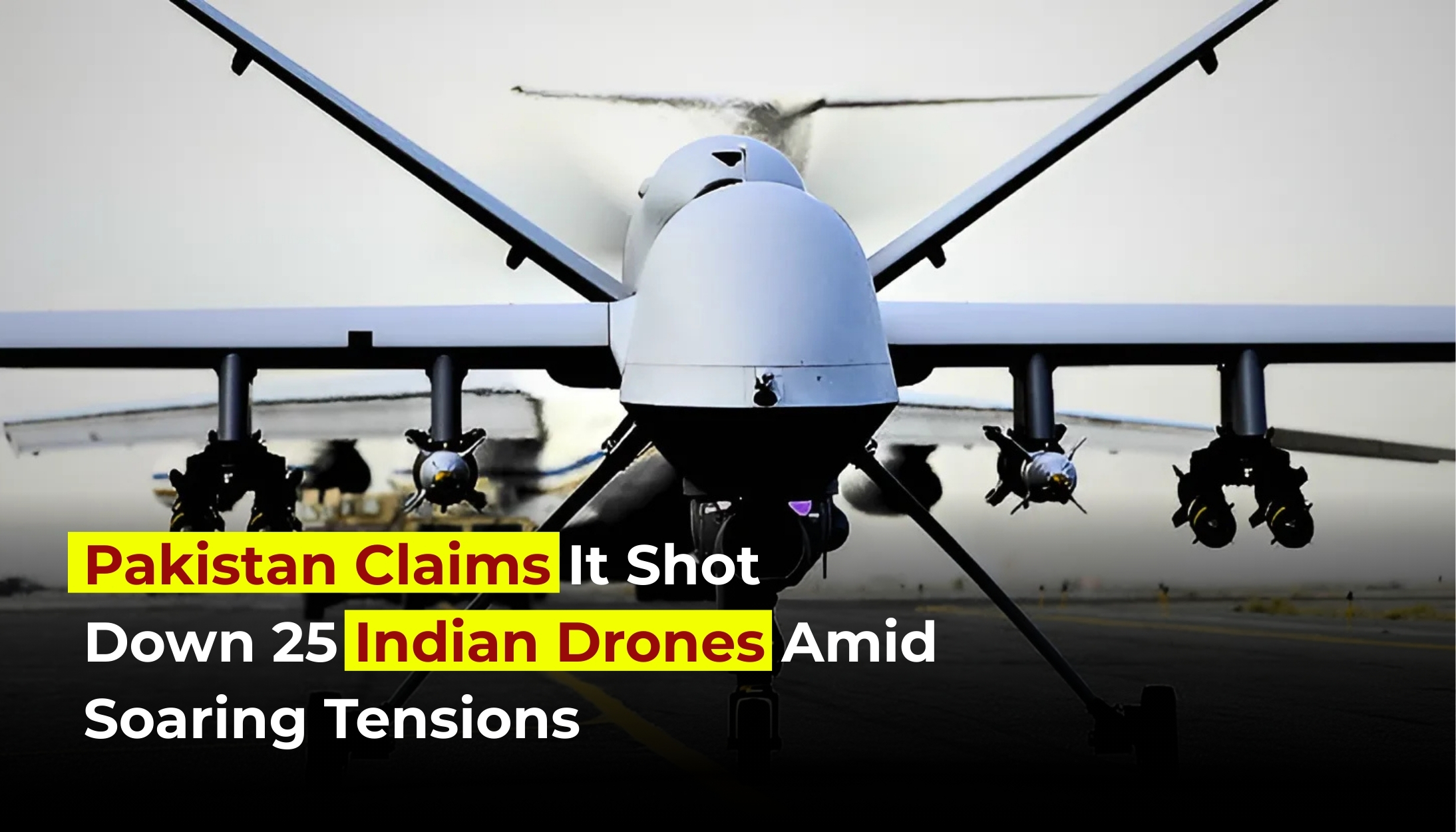Military Confrontation Intensifies as Cross-Border Attacks Spark Fears of Wider Conflict

Pakistan’s military reports shooting down 25 Indian drones as tensions escalate along the border.
Pakistan’s armed forces report intercepting and destroying 25 Indian drones that allegedly breached its airspace, escalating already high tensions between the two nuclear-armed rivals after India launched airstrikes on several targets inside Pakistani territory.
On Thursday, Major General Ahmed Sharif Chaudhry, spokesperson for Pakistan’s military, stated that Indian forces used Israeli-manufactured Harop drones to strike multiple locations, including major cities like Karachi and Lahore.
“Indian drones keep violating Pakistan’s airspace… and such blatant aggression will come at a heavy cost,” warned Chaudhry. According to the military, the drone strikes led to the death of a civilian and injuries to four Pakistani soldiers.
India’s military reported it had "thwarted" Pakistan’s efforts to strike multiple defense positions across its northern and western zones late Wednesday and into early Thursday. According to a statement from the Ministry of Defence, India responded by hitting air defense installations at various sites within Pakistan. The ministry also claimed that Pakistani shelling resulted in 16 fatalities. (Source: Al Jazeera)
The confrontation on Wednesday followed India's announcement a day earlier that it had carried out precision strikes against what it described as “terrorist infrastructure” within Pakistani territory. In response, Pakistan reported that the strikes resulted in the deaths of at lealast 31 civilians.
India’s recent military action came in response to a deadly assault in Indian-administered Kashmir two weeks earlier that left 26 people dead. New Delhi has held Islamabad responsible for the incident, an accusation Pakistan firmly rejects.
Reporting from New Delhi, Al Jazeera’s Neha Poonia noted that conditions along the Line of Control (LoC), the unofficial border dividing Kashmir, are worsening swiftly. “There’s been a sharp rise in the intensity and frequency of military engagements between the two sides,” she observed. For more insight, read our in-depth coverage on India-Pakistan Tension: Real Consequences You Must Know.
The Indian military reported that 13 civilians lost their lives, 59 were injured, and one soldier was killed during the clashes. Villages close to the Line of Control (LoC) have been deserted, with many residents either fleeing the area or seeking refuge in bunkers for safety.
"We haven't witnessed this level of civilian displacement in years," Poonia remarked.
As the security situation intensifies, 20 airports in northern India have been shut down until at least May 10, causing significant disruptions to both travel and business operations.
In response, Pakistan’s Civil Aviation Authority announced that Karachi airport would remain closed until 6 p.m. (13:00 GMT), while airports in Islamabad and Lahore were temporarily shut down "due to operational needs."
Reporting from Islamabad, Al Jazeera’s Kamal Hyder shared that Pakistan's military has accused India of jeopardizing civilian lives and aviation security through repeated violations of its airspace.
Hyder also highlighted a new source of tension: India’s decision to release water into the Chenab River, which Islamabad views as a violation of longstanding agreements, calling it an “existential threat” and even an “act of war.”
“Pakistan’s parliament, with unanimous support across political parties, has now authorized a military response,” Hyder added, reflecting growing concerns of a potential broader conflict.
In the wake of Wednesday’s airstrikes, Pakistani Prime Minister Shehbaz Sharif vowed retaliation, escalating fears that the two nations could be on the brink of another all-out war.
In an effort to mediate, Saudi Arabia and Iran have dispatched their foreign ministers to New Delhi and Islamabad. Meanwhile, India has called an all-party meeting to discuss the situation and share its assessment.
As both India and Pakistan accuse one another of provocation, experts suggest that Pakistan is facing increasing pressure to respond strongly to India’s actions.
“India’s limited objectives have been achieved,” said Happymon Jacob, director of the Council for Strategic and Defence Research in New Delhi, speaking to Al Jazeera. “Pakistan’s main objective is to carry out a retaliatory strike to protect its image both at home and abroad. This is likely to occur.”
Jacob forecasted that the situation might escalate into several rounds of cross-border missile or artillery exchanges, similar to previous confrontations.
Security analyst Hassan Khan told Al Jazeera that Pakistan’s government and military are under immense pressure to react decisively.
“Pakistan will respond, and the people expect that response to be more forceful than what the Indians have done,” he said from Islamabad. Khan speculated that Pakistan may target multiple Indian installations with missiles while avoiding direct engagement along the LoC.
Comments